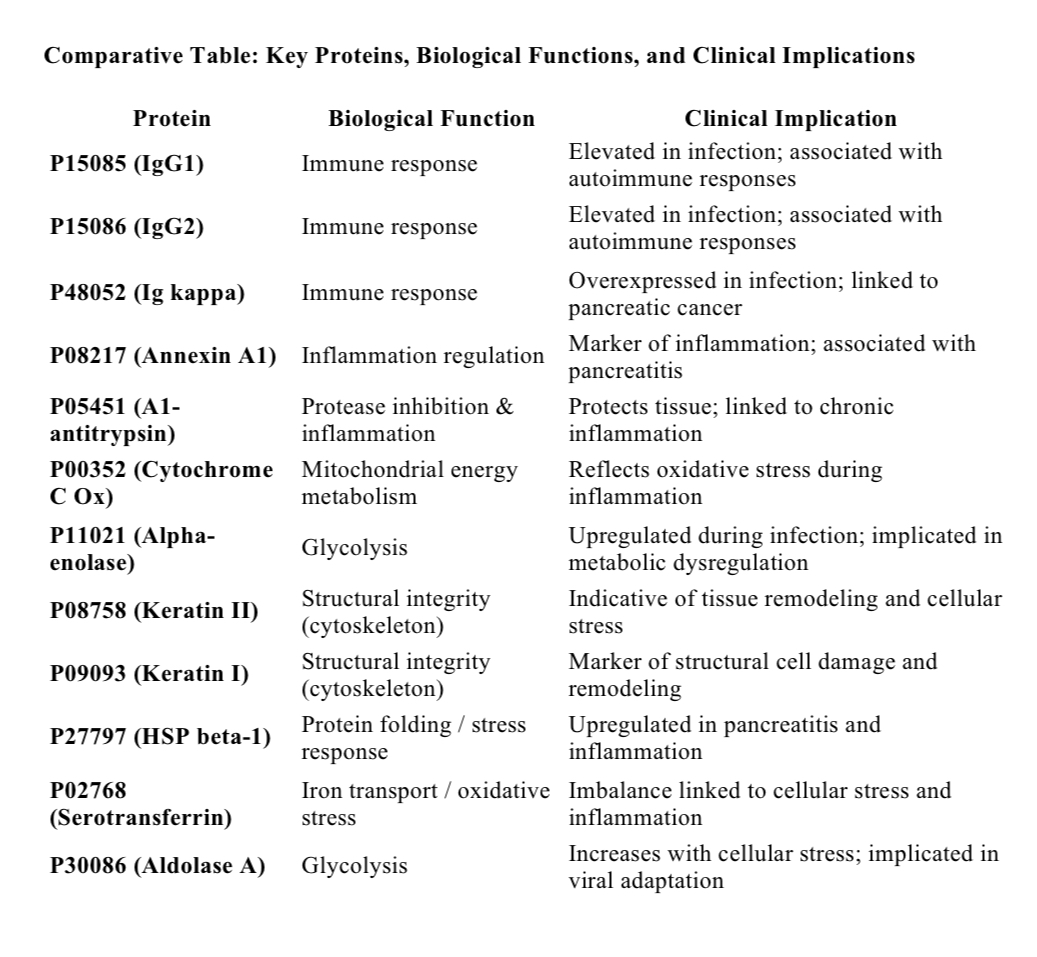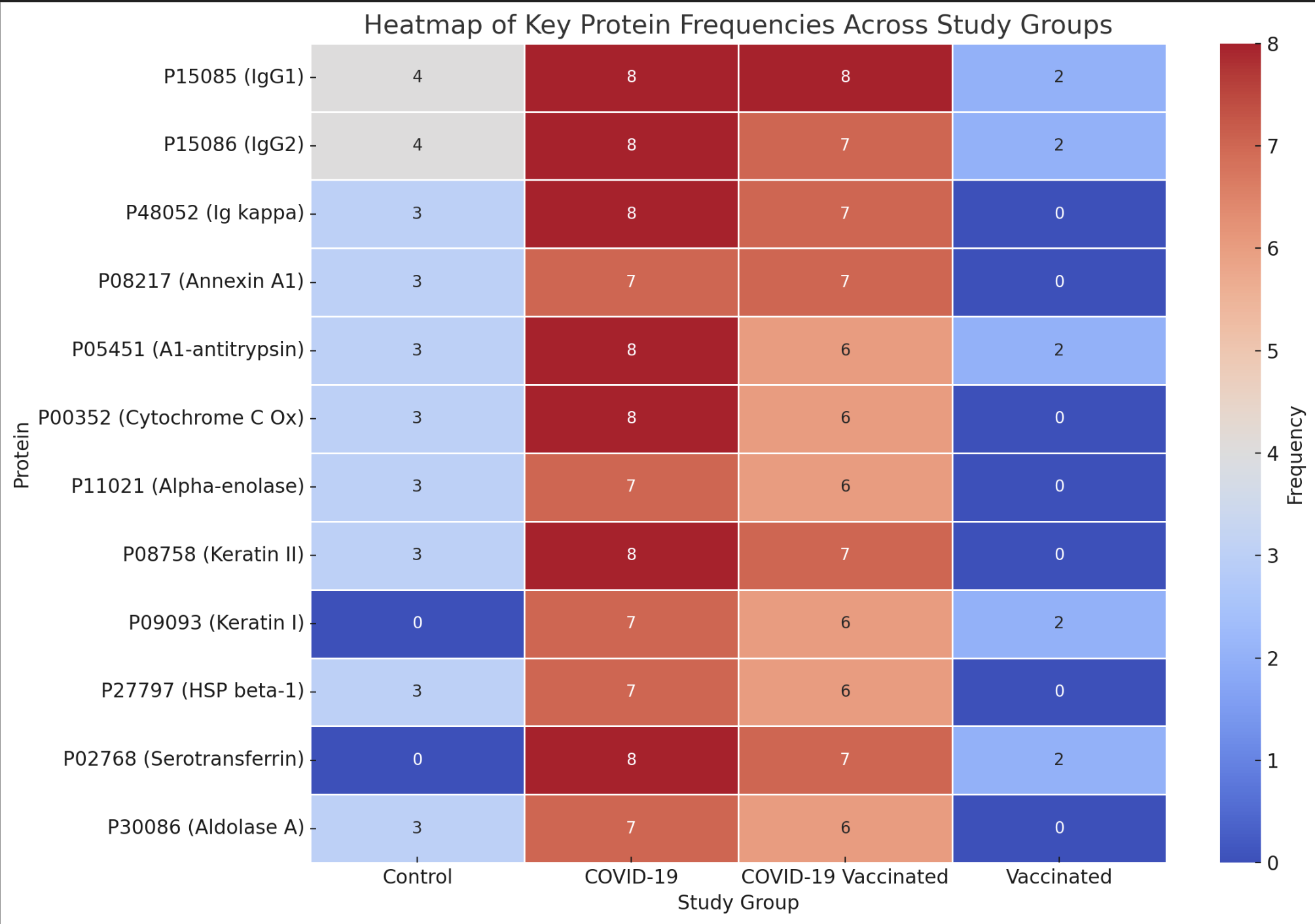Tuesday Poster Session
Category: Biliary/Pancreas
P4319 - Comparative Proteomic Profiling of the Human Pancreas: Effects of COVID-19 and Vaccination
Tuesday, October 28, 2025
10:30 AM - 4:00 PM PDT
Location: Exhibit Hall

Juan C. Santiago-Gonzalez, MD, MSc (he/him/his)
Howard University Hospital
Washington, DC
Presenting Author(s)
Juan C. Santiago-Gonzalez, MD, MSc1, Eric Miranda, PhD2, Deana Hallman-Navarro, MD3, Horacio Serrano-Rivera, PhD2
1Howard University Hospital, Washington, DC; 2University of Puerto Rico School of Medicine, San Juan, Puerto Rico; 3University of puerto rico school of medicine, San Juan, Puerto Rico
Introduction: The pancreas has emerged as a relevant extrapulmonary target of SARS-CoV-2, with growing evidence of metabolic and inflammatory complications following infection. Clinical findings—including elevated amylase/lipase, pancreatic edema, and histologic inflammation—suggest pancreatic involvement. However, the molecular impact of COVID-19 and vaccination on pancreatic tissue remains poorly defined.
Methods: We performed a comparative proteomic analysis of human pancreatic tissue from four groups: controls (N=94 proteins), individuals with COVID-19 (C19, N=172), vaccinated COVID-19 patients (C19V19, N=126), and vaccinated individuals without COVID-19 (V19, N=56). Here, N refers to the number of distinct proteins identified per group, based on inclusion criteria: ≥3 unique peptides and >50% sequence coverage. We analyzed biological processes, cellular components, and molecular functions using frequency distributions and statistical testing (Chi-square, Fisher’s exact; p< 0.05).
Results: COVID-19 infection, regardless of vaccination status, was associated with significant upregulation of proteins related to immune activation (e.g., immunoglobulins P15085, P15086, P48052), inflammation (Annexin A1, Alpha-1-antitrypsin), energy metabolism (Alpha-enolase, Cytochrome c oxidase), and cytoskeletal remodeling (keratins, annexins). Group differences were statistically significant in cytoskeletal (p< 0.001) and general cellular components (p=0.032). Although the C19 and C19V19 groups demonstrated overlapping proteomic signatures, a moderate reduction in inflammatory and metabolic proteins was observed in the vaccinated cohort. The V19 and control groups displayed fewer stress-related proteins overall, while apoptosis- and stress-response markers were uniquely enriched in the vaccinated-only group.
Discussion: These findings demonstrate that SARS-CoV-2 infection induces distinct proteomic alterations in pancreatic tissue, particularly within immune, inflammatory, and metabolic pathways. Vaccination appears to mitigate, but not fully normalize, these changes. Proteomic profiling may provide insight into mechanisms underlying post-COVID pancreatic dysfunction and guide the identification of predictive biomarkers.

Figure: Heatmap displaying the frequency of key proteins across the four study groups:
Red hues indicate higher expression, while blue hues indicate lower expression.
Immune proteins (IgG1, IgG2, Ig kappa) and inflammatory markers (Annexin A1, A1-antitrypsin) are highly elevated in the COVID-19 and COVID-19 Vaccinated groups.
Vaccinated-only individuals show minimal expression of stress or structural proteins, reinforcing the safety profile of vaccination.

Figure: Comparative Table: Key Proteins, Biological Functions, and Clinical Implications
Disclosures:
Juan Santiago-Gonzalez indicated no relevant financial relationships.
Eric Miranda indicated no relevant financial relationships.
Deana Hallman-Navarro indicated no relevant financial relationships.
Horacio Serrano-Rivera indicated no relevant financial relationships.
Juan C. Santiago-Gonzalez, MD, MSc1, Eric Miranda, PhD2, Deana Hallman-Navarro, MD3, Horacio Serrano-Rivera, PhD2. P4319 - Comparative Proteomic Profiling of the Human Pancreas: Effects of COVID-19 and Vaccination, ACG 2025 Annual Scientific Meeting Abstracts. Phoenix, AZ: American College of Gastroenterology.
1Howard University Hospital, Washington, DC; 2University of Puerto Rico School of Medicine, San Juan, Puerto Rico; 3University of puerto rico school of medicine, San Juan, Puerto Rico
Introduction: The pancreas has emerged as a relevant extrapulmonary target of SARS-CoV-2, with growing evidence of metabolic and inflammatory complications following infection. Clinical findings—including elevated amylase/lipase, pancreatic edema, and histologic inflammation—suggest pancreatic involvement. However, the molecular impact of COVID-19 and vaccination on pancreatic tissue remains poorly defined.
Methods: We performed a comparative proteomic analysis of human pancreatic tissue from four groups: controls (N=94 proteins), individuals with COVID-19 (C19, N=172), vaccinated COVID-19 patients (C19V19, N=126), and vaccinated individuals without COVID-19 (V19, N=56). Here, N refers to the number of distinct proteins identified per group, based on inclusion criteria: ≥3 unique peptides and >50% sequence coverage. We analyzed biological processes, cellular components, and molecular functions using frequency distributions and statistical testing (Chi-square, Fisher’s exact; p< 0.05).
Results: COVID-19 infection, regardless of vaccination status, was associated with significant upregulation of proteins related to immune activation (e.g., immunoglobulins P15085, P15086, P48052), inflammation (Annexin A1, Alpha-1-antitrypsin), energy metabolism (Alpha-enolase, Cytochrome c oxidase), and cytoskeletal remodeling (keratins, annexins). Group differences were statistically significant in cytoskeletal (p< 0.001) and general cellular components (p=0.032). Although the C19 and C19V19 groups demonstrated overlapping proteomic signatures, a moderate reduction in inflammatory and metabolic proteins was observed in the vaccinated cohort. The V19 and control groups displayed fewer stress-related proteins overall, while apoptosis- and stress-response markers were uniquely enriched in the vaccinated-only group.
Discussion: These findings demonstrate that SARS-CoV-2 infection induces distinct proteomic alterations in pancreatic tissue, particularly within immune, inflammatory, and metabolic pathways. Vaccination appears to mitigate, but not fully normalize, these changes. Proteomic profiling may provide insight into mechanisms underlying post-COVID pancreatic dysfunction and guide the identification of predictive biomarkers.

Figure: Heatmap displaying the frequency of key proteins across the four study groups:
Red hues indicate higher expression, while blue hues indicate lower expression.
Immune proteins (IgG1, IgG2, Ig kappa) and inflammatory markers (Annexin A1, A1-antitrypsin) are highly elevated in the COVID-19 and COVID-19 Vaccinated groups.
Vaccinated-only individuals show minimal expression of stress or structural proteins, reinforcing the safety profile of vaccination.

Figure: Comparative Table: Key Proteins, Biological Functions, and Clinical Implications
Disclosures:
Juan Santiago-Gonzalez indicated no relevant financial relationships.
Eric Miranda indicated no relevant financial relationships.
Deana Hallman-Navarro indicated no relevant financial relationships.
Horacio Serrano-Rivera indicated no relevant financial relationships.
Juan C. Santiago-Gonzalez, MD, MSc1, Eric Miranda, PhD2, Deana Hallman-Navarro, MD3, Horacio Serrano-Rivera, PhD2. P4319 - Comparative Proteomic Profiling of the Human Pancreas: Effects of COVID-19 and Vaccination, ACG 2025 Annual Scientific Meeting Abstracts. Phoenix, AZ: American College of Gastroenterology.
